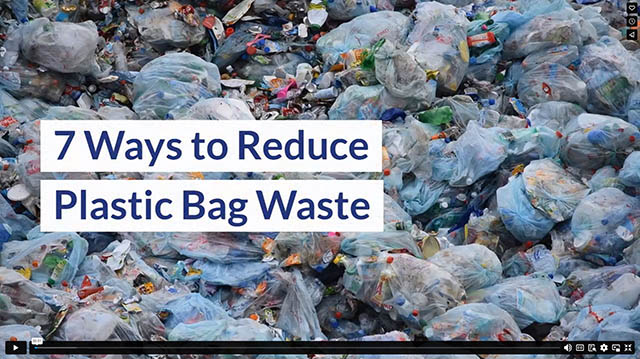7 Ways to Reduce Plastic Bag Waste
We use plastic everywhere because it is incredibly useful. It allows us to store anything in cheap, clean, and lightweight packaging. For being one of the most beneficial inventions to date, plastic gets a lot of hate.
Our extensive use of plastic has created massive amounts of plastic that has reached every corner of the globe, from the tops of mountains to the remote snowscapes of Antarctica.
Why should you try to reduce your plastic waste?
It’s not only about fitting in with your sustainable friends. Plastic doesn’t biodegrade. That means, even if you only use a bottle of water or grocery bag for a few minutes, that piece of garbage will stay around for hundreds of years. Since plastic was only invented in 1907, that means all the plastic ever created is still in the environment today – unless we’ve burned it, releasing toxic chemicals into the atmosphere and increasing greenhouse gas concentrations.
Plastic does its job too well. Because it’s nearly impossible to get rid of, the less plastic we use, the less of a pollution problem we face now and into the future.
What are some concrete things you can do to decrease plastic bag waste?
1. Make reusable bags your best friends.
Whether grocery shopping, looking for new clothes, or gift shopping, reusable bags can take the place of hundreds of plastic bags over their lifetime. The same goes for reusable cups and all sorts of other items. One of the biggest reasons people don’t use reusable bags is because they forget until it’s too late. Keeping a small stash of reusable bags in your car is a great way to avoid forgetting. Some of the ways to use reusable bags include:
- Use a cloth mesh bag for fruits and veggies, rather than the light film plastic bags.
- Switch out plastic sandwich bags for a lunchbox to store your sandwiches.
- Keep hydrated with a refillable water bottle rather than water from plastic bottles (these almost always come in plastic bags).
2. Don’t accept every plastic bag offered to you.
Another significant step toward using less plastic is actively refusing plastic bags on offer. For example, when buying fruits and vegetables, most supermarkets have rolls of light plastic bags to use. For a lot of produce, these are superfluous. Just place oranges, onions, bananas, and other thick-skinned produce straight in your cart or reusable bags.
Checkouts at retail stores are also places where you can often refuse plastic bags actively. It can be slightly less convenient to carry items separately if you forgot your reusable bags, but it’s not that big of a deal unless you have armloads of items.
3. Reuse plastic bags.
You can almost always reuse plastic bags you end up with for longer than you might expect. Some brands of zip-close bags are exceptionally well designed and can be washed and reused for months. Simply add them to your dishes pile and then hang them up to dry above your sink or on a drying rack. The great thing about reusing things is that it also saves you the money buying new ones.
4. Recycle plastic bags.
For a long time, plastic recycling was limited to only hard plastics, like milk jugs and Coca-Cola bottles. While this kind of recycling has its own drawbacks and controversies, new organizations have found ways to recycle soft plastics too. Most municipal waste management companies won’t collect these from your house. However, if you Google “waste disposal near me,” you’ll likely find a convenient company willing to pick up and transport your soft plastic waste to a recycling plant.
5. Collect litter.
Picking up rogue plastic bags that have found themselves in the environment is another great way to help reduce the plastic problem. People often feel too small to make any real difference by picking up litter. However, even if you don’t hugely reduce the total amount of plastic waste, a clean place positively affects people’s well-being and appreciation of nature compared to a litter-filled neighborhood.
Litter collection is another excellent reason to look into garbage pick-up services or rent a disposal container.
6. Choose sustainably packaged foods.
Many times, supermarkets stock two or more of the same item. They might vary slightly in cost or place of origin or name brand. We often automatically select the cheapest option, no matter what. Some brands, however, may use paper for packaging their items. Supporting these brands is a great way to reduce how many plastic bags you come in contact with. Some common foods that have alternative packaging options include:
- Oats
- Bread
- Crackers
- Cold Cereals
- Produce
7. Find bulk food options.
Finally, many smaller grocery stores these days allow you to scoop bulk items, like rice, grains, and cooking essentials, directly into your containers. Capitalizing on bulk stores like this saves money and plastic bag waste.
In the end, reducing plastic bag waste is a lifestyle change that your kids and grandkids will thank you for. After divorcing from the constant use of plastic bags, you’ll wonder why you ever used so many in the first place.
Infographic
Plastic bags are everywhere, even in places where they should not be like in the street or in landfills. We agree plastic bags are useful but since they are non-biodegradable, it causes a serious problem for us and future generation. So, what can you do to help reduce plastic bag waste? Here are some concrete actions you should do.


